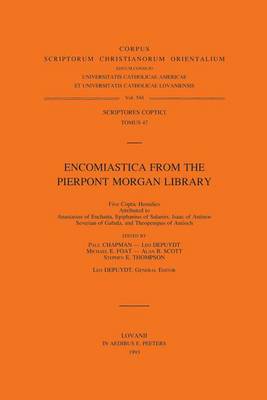Corpus Scriptorum Christianorum Orientalium, Scriptores Coptici
2 total works
v.43
Homiletica in the Pierpont Morgan Library is the first volume in a collaborative effort to edit and translate what has remained unpublished of the Coptic literary texts kept at the Pierpont Morgan Library in mid-town Manhattan, New York City. The showpiece of the Morgan collection is a group of some fifty parchment codices acquired in 1911 in Paris for Pierpont Morgan, the American financier and philanthropist, and discovered in 1910 on the site of an ancient monastery near present-day Hamuli in the Faiyum. The eminent Coptologist Walter Ewing Crum called them "the largest and, in some ways, the most important of extant collections, ...a body of texts unparalleled for completeness, if not for variety."
v.47
"Encomiastica from the Pierpont Morgan Library" continues a collaborative effort to make available in edition and translation what remains unpublished of the Coptic literary manuscripts at the Pierpont Morgan Library. A first volume appeared under the title Homiletica from the Pierpont Morgan Library (CSCO 524 and 525). The introduction to the text volume includes sections on the texts, the manuscripts, and the language, as well as some addenda to Homiletica and to the Catalogue of Coptic Manuscripts in the Pierpont Morgan Library (Peeters 1993). In the introduction to the translation volume, S. Harvey discusses the cultural and historical setting of the five texts. The texts are attributed to Anastasius of Euchaita, Epiphanius of Salamis, Isaac of Antinoe, Severian of Gabala, and Theopempus of Antioch, but these attributions are probably spurious. The works may have been composed as late as the seventh or eight century AD in Coptic, with the thematic features being derived from earlier sources, possibly including Greek church fathers, and in certain instances perhaps even the authors to which they are attributed; but this matter awaits further investigation.

